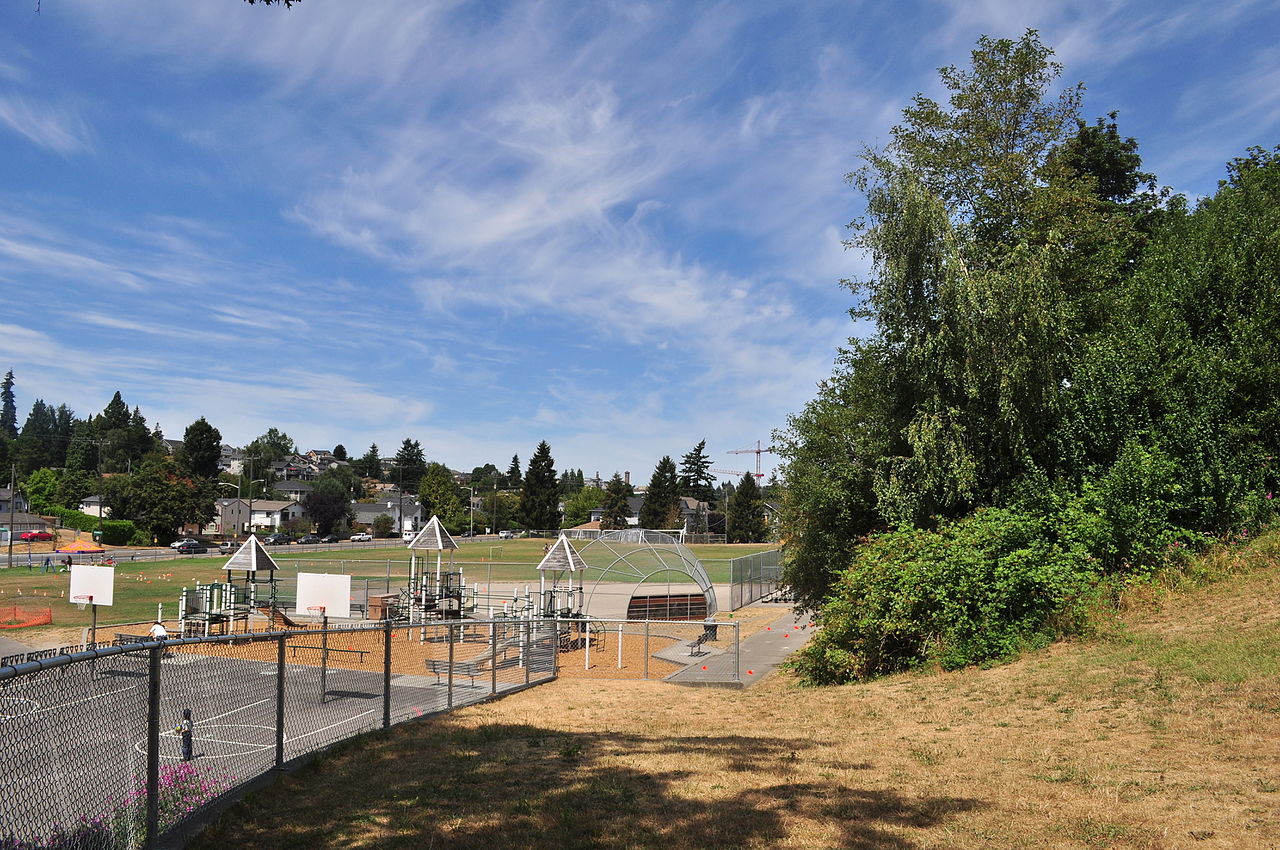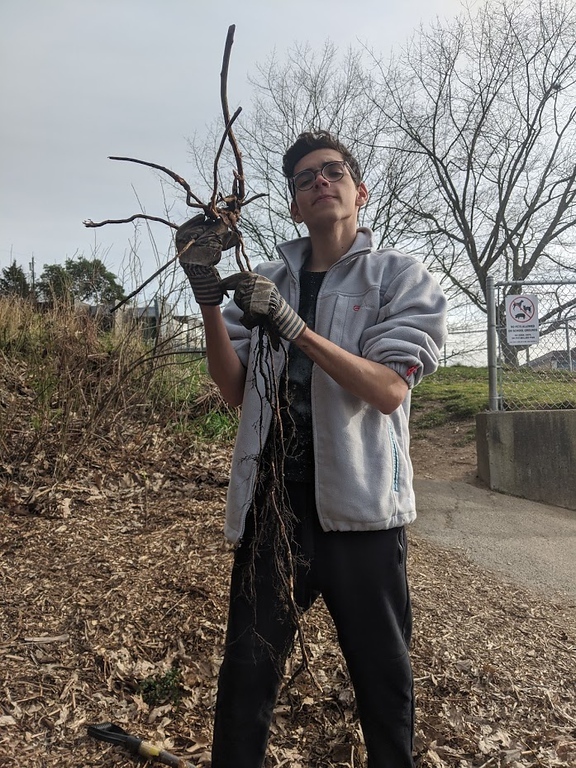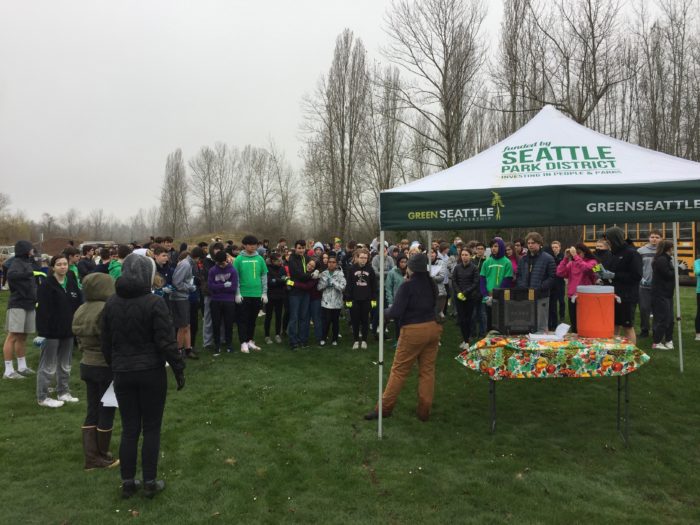
Earlier this year I had the pleasure of talking to Kai Carlos Vasconcelos, an exchange student from Brazil who was here from January to June. Of course, the shape of everyday life changed dramatically during his time here, but one of the things he got to embrace was restoration work at Fairmount Park. His host mom, Christine Deppe, is one of GSP’s amazing forest stewards, and together they spent much of the past months restoring Fairmount. I sat down with Kai, who gave me some unique perspectives as both an exchange student, and a young person trying out restoration for the first time. Check it out below!

Kai holding a large Himalayan Blackberry root
Q. So what kind of restoration work have you been doing?
We’ve mostly been cutting lots of blackberries. We try to figure out ways to take out the invasive plants. We also work on planting new species and restoring the place.
I never did stuff like this before. Here it was kind more of an obligation at first, because I had to do it for the exchange program. But with time I started liking it; cutting blackberries, feeling connected, it was nice.
Q. What has kept you interested?
I think it’s the small things that happen when you’re working in nature. Me and my host mom—she’s the one that helps me do the work—we have rituals. We talk a lot while we work. At 6 pm everyday there’s a guy who plays saxophone for us, it’s really cool. Those small things keep me really interested.
Q. Do you feel like you see nature differently now after doing this kind of work?
I mean, I grew a big big bond to all those types of plants and trees, and every time I see them on the street I go, “whoa I know that plant!” I get really excited. My host mom taught me a lot about tracking animals. Bird tracks, dogs, and that kind of thing. We usually look at the mud under the bridges, and just spend a lot of time outside. I also learned a lot about vegetation and all the types of plants and flowers, the Pacific Northwest, it’s just so amazing.
Q. Does anything like the Green Cities volunteering program exist where you’re from?
We have some people who volunteer and do restoration work in Brazil, but not with a lot of passion I would say. When I came out here and saw all the people working, and being connected, it’s so hopeful. It makes me feel good about this situation in this place.
Q. Are environmental issues something you’ve thought a lot before? Were you an environmentalist before?
I wouldn’t say I was really concerned about the world’s problems before. But I tried really hard to not do stupid things. Now I would say it’s way better.
Q. Do you think there’s a specific way to get people more into this kind of work? Or is it about finding people who are already interested?
I think if you show people my age how important, and how good this feels to the world and to yourself, they can probably start working hard to make this world better for them in the future. I do believe that every help is necessary. I think we have to find people to help, people like me.
“When I came out here and saw all the people working, and being connected, it’s so hopeful”
Q. Do you feel like this work is accessible to you? How hard was it to start learning and doing this work?
It was kind of easy I would say. I liked nature before, and when my host mom helped me with the volunteer hours, we started hanging out together and she taught me how it feels so good to be somewhere….I don’t really know how to explain. It’s just a really good feeling you know?
Q. Does this feel like something you think other people your age would be interested in?
Yeah, for sure. The majority of teenagers right don’t care a lot about this sort of stuff. But still, I know there are some people out there who really care about this. It’s kind of a challenge to bring people’s attention to this. But if you work hard, and give opportunities, everyone can change their thinking.

Q. When you return to Brazil, do you imagine yourself building upon this kind of work or sharing it with others?
Yeah, for sure. I’ve been researching the vegetation in my state now, and I’m trying to look for places where I can volunteer, and try to change the place I live. I hope someday I can come back here and relive every experience, and teach new people about everything I went through. This is really important, and I do believe that everyone has to get at least a little bit of information about this experience, and this chance.
Q. I’m curious about invasive species in Brazil, I imagine it’s pretty different?
Well it’s definitely warmer and wetter!
Q. Seattle is a place with a lot of green space and trees. How does it compare to your area in Brazil?
It’s very different. When I came here, I didn’t expect there to be so many parks all around this place. Where I live we don’t have many parks. You have to look really hard to find a cool park that’s nature oriented instead of people oriented.
Q. Do you have any fun stories or important messages to leave off on?
I really want people to see how important we can be to the world, and the place we live in. No matter how you are or where you’re from, you can change the world. You can change the way you see things, feel things, and experience things. It’s really great to have a chance to be here and to try helping, because we really need to help. The world needs help right now.
As you can see, Kai had the awesome and inspiring experience of adjusting to a new city, and embracing a new activity. He has some profound thoughts on the importance of people–young people–getting out and doing restoration work, and how accessible and fun it can be for just about anybody. His optimism about our ability to change ourselves and the world is especially inspiring to see, in a time where so much negativity pervades our everyday lives. We wish him well on his future journeys, and hope his experiences in Seattle, and with restoration will stay with him and keep him inspired.
